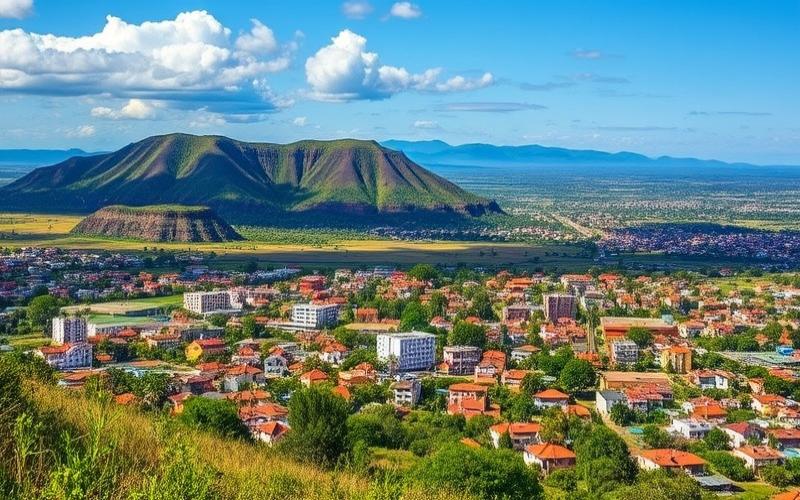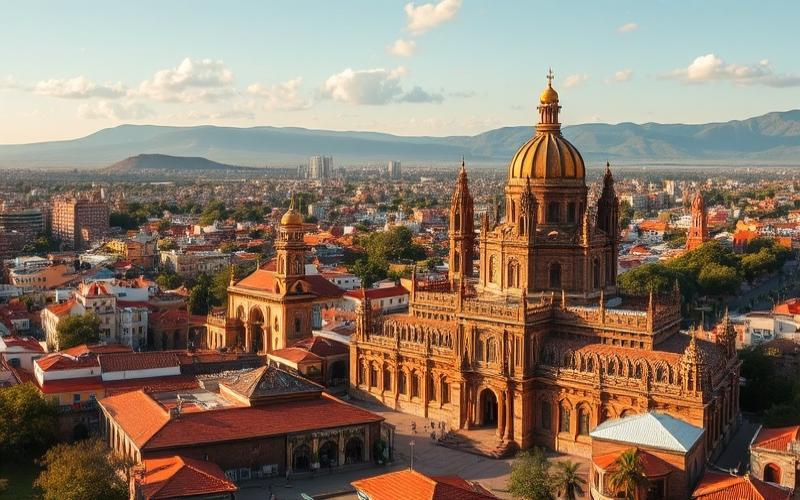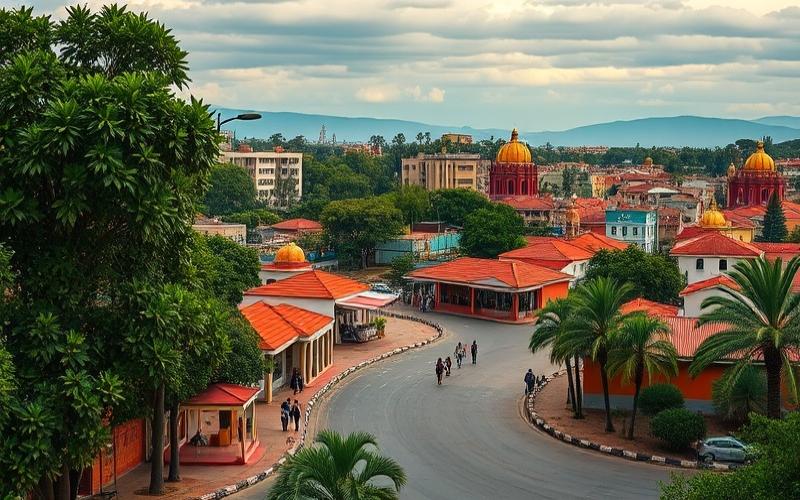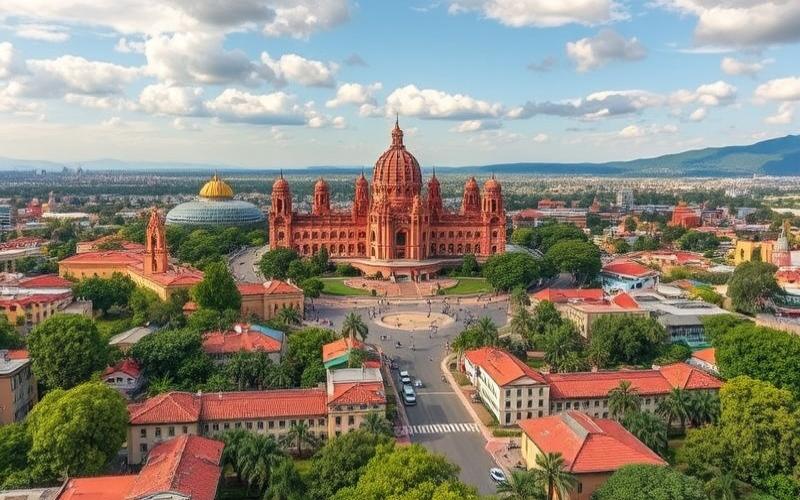
 Published on and written by Cyril Jarnias
Published on and written by Cyril Jarnias
Navigating the maze of real estate succession in Madagascar can prove complex due to the specific legal and cultural aspects attached to it. In this country where land holds a central place in the economy and family life, it is crucial to understand the complete procedure and current legislation to ensure a transfer that is both legal and fair.
From administrative steps to estate planning, each stage requires particular attention to avoid disputes. This article therefore aims to guide you meticulously through the intricacies of Malagasy real estate succession, providing you with practical advice and detailed information for a serene and efficient management of your real estate inheritance.
Anticipating Cross-Border Transfer
In Madagascar, the transfer of real estate property to heirs residing abroad is governed by Law No. 68-012 of July 4, 1968, relating to successions, wills, and donations. This legislation constitutes the legal foundation for any succession matter on Malagasy territory.
For heirs residing abroad who are to receive property located in Madagascar, it is important to note that the default applicable law is that of the deceased’s habitual residence at the time of death. However, the deceased can expressly choose in their will the law they wish to apply to their succession, particularly in cases of multiple nationalities.
Administrative and Legal Requirements
To benefit from customs duty exemption when importing inherited goods from abroad, several conditions must be met:
- The applicant must be the heir of the deceased up to the fourth degree
- The applicant must reside in Madagascar
- The inherited goods must show signs of use
- The importation must be done in one single shipment within one year from the taking of possession
The necessary documents to provide to the Legislation and Regulation Service include:
- Certificate of domicile in Madagascar
- Certificate from the authorities of the place of departure or from a notary certified by the Embassy or Consulate
- Death certificate of the deceased
- Document establishing the family relationship between the applicant and the deceased
- Will or other document establishing the succession devolution
Tax Implications
Regarding taxation, heirs and universal legatees are required to pay certain charges on the estate assets according to a specific order established by Malagasy law. It is important to note that if the estate value is greater than or equal to 5,000 euros, the intervention of a notary becomes mandatory to establish the necessary documents.
| Aspect | Requirement |
|---|---|
| Residence | The beneficiary must reside in Madagascar for the customs duty exemption |
| Deadline | Importation in one single shipment within the year following the taking of possession |
| Documentation | Death certificate, domicile certificate, proof of relationship, will |
| Notarial Intervention | Mandatory if the estate exceeds 5,000 euros |
Practical Tips for Non-Resident Heirs
For individuals living abroad who own property in Madagascar, it is recommended to anticipate their succession through a will, particularly by specifying the desired applicable law. Although one can choose the applicable law for their succession by will, one cannot choose the applicable tax regime.
For non-resident heirs, it may be wise to appoint a legal representative in Madagascar to facilitate administrative procedures. The complexity of international successions may require the assistance of a lawyer specialized in succession law to navigate this process effectively.
Good to Know:
During the cross-border transfer of real estate property in Madagascar, it is crucial to familiarize oneself with Ordinance No. 62-038, which governs succession matters, especially for heirs residing abroad. Madagascar does not have specific bilateral agreements concerning successions, making the process dependent on national legislation and international agreements of mutual recognition. Non-resident heirs often must appoint a legal representative in Madagascar to handle administrative affairs and comply with strict legal deadlines. From a tax perspective, inheritance taxes may apply, with varying amounts depending on the property value, which can be complicated by currency fluctuations. To facilitate this process, it is often recommended to consult a local notary and inquire about any existing tax benefits, in order to optimize the management and transfer of the inheritance without increasing unnecessary costs.
Inheriting Property in Madagascar: Rights and Procedures
Real estate succession in Madagascar is primarily governed by Law No. 68-012 of July 4, 1968, relating to successions, wills, and donations. This legislation establishes that upon the opening of the succession, it is transferred by operation of law to the heirs without the need for any particular formality, which simplifies the initial transfer of property.
Inherent Rights and Taxation
- Heirs automatically acquire rights to real estate properties after the owner’s death.
- Fees are to be expected, notably taxes related to the inheritance declaration and property transfer. These taxes vary according to the property value and the relationship between the heir and the deceased.
- Certain tax exemptions may apply depending on particular situations or close family ties.
Administrative Procedures for Recognition and Legal Transfer
- Obtaining Essential Documents:
- Death certificate of the deceased,
- Certificates proving residence,
- Legalized identity copies of the heirs.
- Role of the Notary:
- The notary plays a central role in the liquidation and distribution of the estate,
- They ensure the authentication of documents necessary for the legal transfer,
- In case of disagreement between heirs or dispute, a notary may be appointed by the court to proceed with a judicial partition.
- Land Registration System:
- After agreement between heirs or a court decision, official registration with the Malagasy land service must be carried out to guarantee definitive legal recognition.
Influence of Customary Laws
Especially in rural areas, customary rules have a notable influence on real estate successions:
- The principle of masi-mandidy, deeply rooted in Malagasy culture since before Andrianampoinimerina, often assimilates the testamentary will as a sovereign word respected by all family members.
- These traditions can sometimes take precedence over certain written provisions if they are generally accepted in a local community.
Practical Tips to Facilitate the Process
To avoid unnecessary complications during a real estate succession in Madagascar:
- Carefully gather all official documents related to the deceased (death certificate, land titles),
- Check if a will exists to respect its validity according to the modalities provided by law,
- Quickly consult a notary upon the opening of the succession to clarify rights and obligations,
- Inquire locally about any potential customary rules that might impact your case, especially in rural areas,
- Anticipate fees related to inheritance taxes by inquiring with the competent tax services.
Common pitfalls notably include:
- The absence or loss of indispensable official documents (death or property certificates),
- Family conflicts delaying or even blocking the distribution without judicial intervention,
- Lack of knowledge of local customary specifics that can lead to disputes,
Following these recommendations allows for better navigation of administrative procedures while ensuring that your inheritance rights are legally recognized with efficiency.
Good to Know:
Inheriting real estate property in Madagascar requires understanding the specific rights and procedures of this country. Fees generally include inheritance duties and property taxes, with possible exemptions under certain conditions. The property transfer must be validated by a notary, who ensures the authenticity of documents and registration with local land services. In rural areas, customary laws can influence the succession process, where local customs may take precedence over written laws, sometimes complicating legal procedures. It is essential to have all required documents, such as the original owner’s death certificate and the certificate of inheritance, to avoid delays or disputes. It is advisable to be accompanied by a specialist familiar with both customary law and written law to navigate this complex process effectively, especially in areas where customary practices are entrenched.
Understanding Inheritance Rights for Foreigners
The legal framework for successions in Madagascar is based on Law No. 68-012 of July 4, 1968, which establishes the foundations of Malagasy inheritance law, combining both ancestral customs and rules of human progress. This legislation is structured around 130 articles divided into five titles, preceded by a preliminary title grouping general provisions relating to the opening of successions and the capacity required to inherit.
Fundamental Principles Applicable to Foreigners
The opening of a succession in Madagascar takes place at the domicile of the deceased, and all succession actions fall under the jurisdiction of the court of that domicile. For foreigners owning property in Madagascar, this principle is particularly important as it determines the competent jurisdiction.
Conditions for Customs Exemption for Foreign Heirs
To benefit from customs duty exemptions when inheriting goods from abroad, two essential conditions must be met:
- The applicant must be the heir of the deceased up to the fourth degree
- The applicant must reside in Madagascar
Law Applicable to International Successions
In the international context, determining the law applicable to a succession involving foreigners can prove complex. By default, it is the law of the deceased’s habitual residence at the time of death that applies. However, a person with multiple nationalities can expressly choose, by will, the national law they wish to apply to their succession.
Deadlines and Declarative Obligations
The inheritance declaration must be made within six months following the date of death when it occurred in France. For foreigners residing in Madagascar, it is advisable to verify the specific deadlines applicable according to Malagasy legislation.
Inheritance Taxation and Risk of Double Taxation
| Situation | Applicable Rule |
| Deceased domiciled in Madagascar, heir abroad | Application of Malagasy tax rules |
| Deceased domiciled abroad, heir in Madagascar | Possible exemption under conditions |
| Dual residence | Risk of double taxation |
In the absence of a tax treaty between Madagascar and the heir’s country of residence, there is a real risk of double taxation. For example, if an heir has been domiciled in France for at least six years during the ten years preceding the death, France may tax all assets, including those located in Madagascar.
Practical Recommendations
Given the complexity of international civil and tax rules regarding succession, it is strongly recommended for foreigners owning property in Madagascar:
- To establish an international will clearly specifying the applicable law
- To conduct an expatriation asset review
- To consult experts in international succession law
Preparing one’s succession in advance is particularly important for internationally mobile persons, to avoid legal and tax complications for their heirs.
Good to Know:
In Madagascar, inheritance laws for foreigners stipulate that they can inherit real estate provided the original acquisition complied with local rules. Foreigners are subject to the same administrative procedures as nationals but must obtain special authorization from Malagasy authorities before inheriting real estate. Inheritance duties include a variable tax, generally around 5% to 10% of the property value. Some bilateral agreements, primarily with France, can influence inheritance rights, notably by providing for exemptions or tax reductions. A recent case illustrated the necessary steps when a French national inherited a villa in Antananarivo, highlighting the importance of consulting a local notary to ensure legal and tax compliance.
The Role of the Notary in an International Succession
The notary plays a fundamental role in international successions involving real estate in Madagascar. Their mission revolves around several essential responsibilities that guarantee the legal security of transactions and respect for the rights of heirs.
Specific Responsibilities of the Notary in the International Context
The notary must determine the law applicable to the succession according to the principles of private international law. This crucial step allows for the identification of the legal framework that will govern all estate assets, whether movable or immovable. In Madagascar, the notary or public authenticating officer is responsible for drawing up public deeds, notably wills, in the presence of two witnesses in accordance with Malagasy legislation.
The notary also facilitates the translation and validation of international documents necessary for the settlement of the succession. This task involves obtaining certified true translations for all foreign deeds and their legalization or apostille to guarantee their admissibility before Malagasy authorities.
Managing Difficulties Related to Different Legislations
| Difficulty | Solution Provided by the Notary |
| Conflicts of Laws | In-depth analysis of bilateral conventions and application of private international law rules |
| Double Taxation | Implementation of tax treaties to eliminate taxation by two states on the same transaction |
| Recognition of Foreign Deeds | Adapted authentication and legalization procedures |
The notary must navigate between different legal systems, particularly when the succession involves foreign elements. They must identify the heirs and verify their rights according to the applicable law, while taking into account the specificities of Malagasy law.
Key Steps Requiring Notarial Intervention
- Establishment of the act of notoriety proving heir status, mandatory when the estate amount is greater than or equal to 5,000 euros
- Authentication of succession documents
- Verification of the identity and rights of foreign heirs
- Drafting of real estate property transfer deeds
- Coordination with tax authorities for mandatory declarations
The notary’s intervention is particularly important for obtaining the certificate of domicile in Madagascar and the certificate from the authorities of the place of departure or from a notary certified by the Embassy or Consulate, documents indispensable for customs exemptions in the context of inheriting goods from abroad.
Particular Skills Required
The notary handling international successions must possess in-depth expertise in private international law and precise knowledge of applicable bilateral conventions. They must master the procedures for legalization and apostille of foreign documents and understand cross-border tax implications.
Essential Documents to Gather or Authenticate
- Certificate of domicile in Madagascar
- Certificate from the authorities of the place of departure certified by the Embassy or Consulate
- Foreign will requiring authentication
- Act of notoriety establishing heir status
- Identity documents of foreign heirs
- Title deeds of real estate properties located in Madagascar
Importance of Communication Between International Notaries
Collaboration between notaries from different countries is essential to ensure the efficiency and legal security of the succession. This cooperation allows for the exchange of information on estate assets, verification of the authenticity of foreign documents, and coordination of procedures in each concerned jurisdiction.
International Tax Implications
The notary must take into account bilateral tax treaties to avoid double inheritance taxation. They must inform the heirs of declarative obligations in each concerned country and of the mechanisms for eliminating double taxation provided by international conventions. This international tax expertise constitutes a significant added value of the notary in the context of a succession involving real estate in Madagascar.
Good to Know:
In the context of an international real estate succession in Madagascar, the notary plays a key role by guaranteeing the legal compliance of deeds in a complex transnational context. They must navigate between the divergent legislations of the involved countries, which requires sharp expertise in private international law and international taxation. The notary is crucial during the inventory of assets, verification of wills, and authentication of documents such as property deeds and death certificates, while ensuring effective communication with foreign counterparts to prevent conflicts of laws. Their responsibility also includes analyzing tax implications, such as inheritance duties, and developing strategies to optimize costs for the heirs. This function requires rigorous coordination, notably during the property transfer phase, to ensure a smooth succession compliant with local and international rules.
Disclaimer: The information provided on this website is for informational purposes only and does not constitute financial, legal, or professional advice. We encourage you to consult qualified experts before making any investment, real estate, or expatriation decisions. Although we strive to maintain up-to-date and accurate information, we do not guarantee the completeness, accuracy, or timeliness of the proposed content. As investment and expatriation involve risks, we disclaim any liability for potential losses or damages arising from the use of this site. Your use of this site confirms your acceptance of these terms and your understanding of the associated risks.




















































